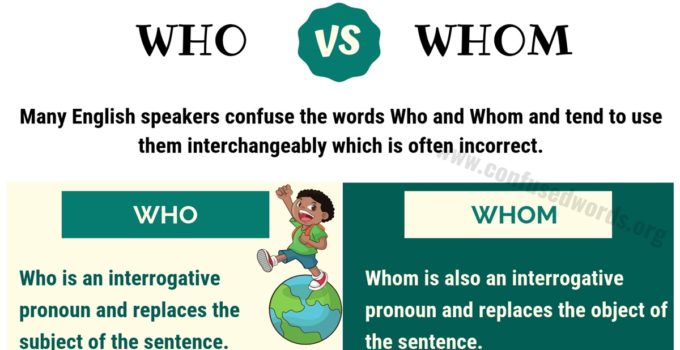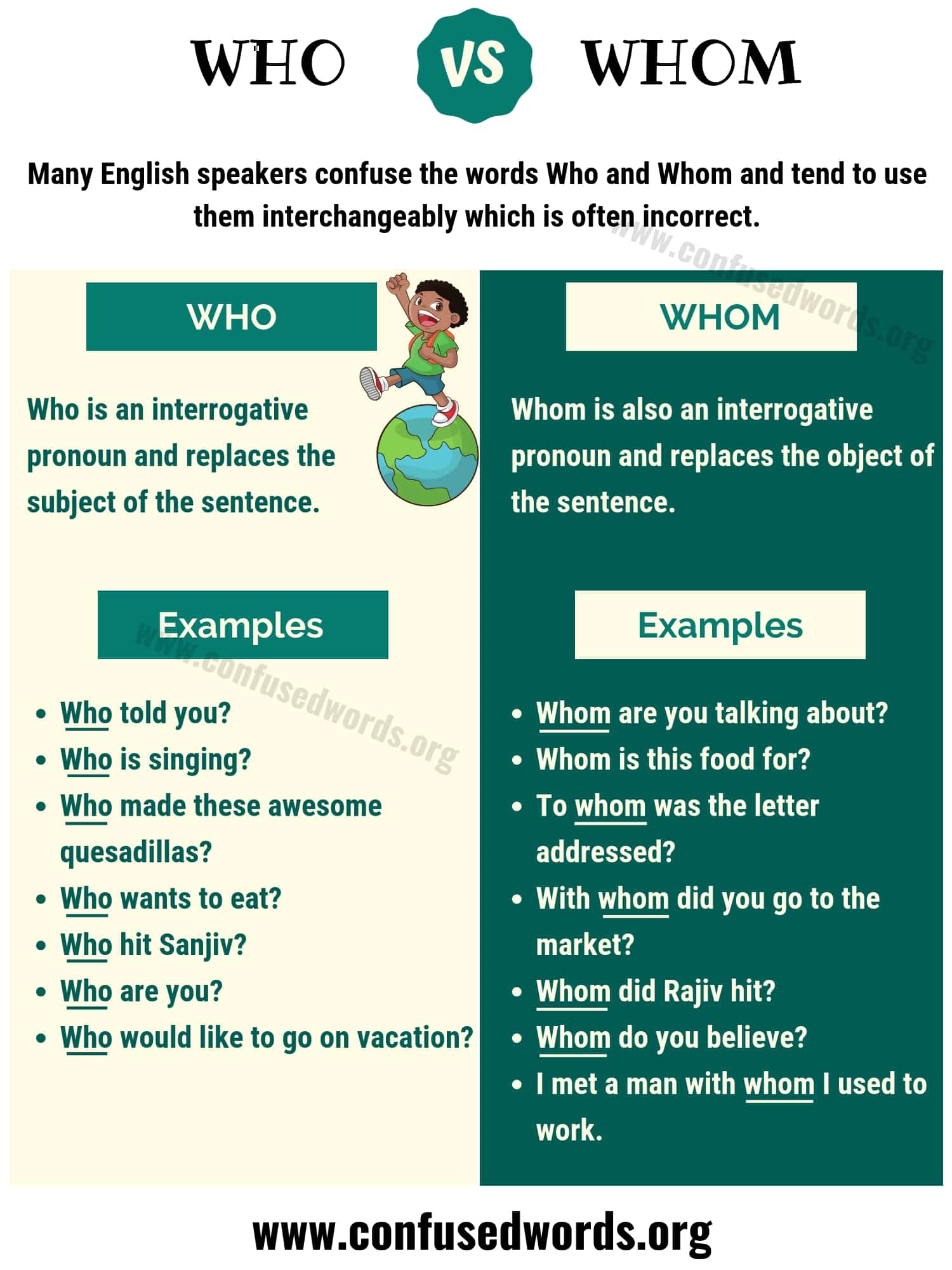Who vs. whom!!! Knowing when to use “who” and “whom” in the English language can be a tricky task for many writers. While these two words may seem interchangeable, they actually have different grammatical uses.
In this article, we will explore the rules for using “who” and “whom” in English writing. We will provide examples and tips to help writers understand when to use each word correctly. Whether you are a native English speaker or learning English as a second language, understanding the difference between who vs. whom is an important aspect of writing in English.
Contents
Who vs. Whom
Definition and Usage
“Who” is a subject pronoun, which means it is used to refer to the person who is performing the action in a sentence. On the other hand, “whom” is an object pronoun, which means it is used to refer to the person who is receiving the action in a sentence.
To determine whether to use “who” or “whom,” you can ask yourself whether the pronoun is the subject or object of the sentence. If the pronoun is the subject, use “who.” If the pronoun is the object, use “whom.” Another helpful trick is to substitute “he” or “she” for “who” and “him” or “her” for “whom” to see which one sounds correct.
“Whom” is often used after prepositions, such as “to,” “for,” or “with.” For example, “To whom did you give the book?” In this sentence, “whom” is the object of the preposition “to.”
Examples
Here are some examples to help illustrate the difference between who vs. whom:
- Who is going to the party? (subject)
- Whom did you invite to the party? (object)
- Who is the best candidate for the job? (subject)
- To whom should I address the letter? (object of the preposition “to”)
- Who is that girl standing over there? (subject)
- Whom did you see at the movie theater? (object)
In summary, “who” is used as a subject pronoun, while “whom” is used as an object pronoun. Remember to consider whether the pronoun is the subject or object of the sentence, and use the appropriate pronoun accordingly.
When to Use Who
The pronoun “who” is used as a subjective case pronoun. It is used to refer to the subject of a sentence. The subjective case pronoun “who” is used when the pronoun is the subject of a clause or sentence. It is used to refer to people, animals, or things that are performing the action of the verb.
Examples:
- Who is coming to the party tonight?
- Who is the best candidate for the job?
- Who ate all the cookies?
- Who is responsible for the mess in the kitchen?
- Who is the captain of the team?
In these examples, “who” is used as the subject of the sentence. It is used to refer to the person or thing that is performing the action of the verb.
It is important to note that “who” is always used as a subjective pronoun. It is never used as an object pronoun. When referring to the object of a sentence, the pronoun “whom” is used instead.
When to Use Whom
“Whom” is an object pronoun used in the objective case. It is used when referring to the object of a verb or a preposition. In other words, “whom” is used to refer to the person or people who are receiving the action of the verb.
Examples:
Here are some examples of how to correctly use whom in sentences:
- To whom did you give the book?
- Whom should I invite to the party?
- With whom are you going to the concert?
- Whom did the teacher choose to answer the question?
In each of these examples, “whom” is used to refer to the person or people who are receiving the action of the verb. It is important to note that “whom” is only used in the objective case and not the subjective case.
When deciding whether to use who vs. whom, it can be helpful to substitute he or him in the sentence. If he would be used, then “who” is the correct choice. If him would be used, then “whom” is the correct choice.
Using Who vs. Whom in Sentences
When writing or speaking in English, it is important to use the correct pronoun to refer to people. The two most commonly used pronouns for this purpose are “who” and “whom.” While they may seem interchangeable, they have different grammatical functions and should be used appropriately.
Subject of a sentence:
- Who is coming to the party tonight?
- Who made this delicious cake?
Object of a verb:
- Whom did you invite to the party?
- Whom should I ask for help?
Object of a preposition:
- To whom did you give the gift?
- From whom did you receive the letter?
Relative clauses:
- The woman who is wearing a red dress is my sister.
- The man whom I met at the conference is a renowned scientist.
In general, “who” is used as the subject of a sentence or clause, while “whom” is used as the object of a verb or preposition. However, there are some exceptions to this rule.
When using a preposition at the beginning of a sentence or clause, “whom” is always the correct choice. For example:
- To whom it may concern
- With whom are you going to the concert?
It is also important to note that in informal speech, “who” is often used in place of “whom.” While this may be acceptable in some situations, it is still important to understand the correct usage of these pronouns in formal writing and speech.
In addition, relative clauses can be a bit tricky when it comes to deciding whether to use “who” or “whom.” In a relative clause, “who” is used to refer to the subject of the clause, while “whom” is used to refer to the object of the clause. For example:
- The woman who I met at the party is a doctor. (I met her)
- The man whom I gave the book to is my neighbor. (I gave the book to him)
Interrogative Pronouns
Interrogative pronouns are used to ask questions. In English, the main interrogative pronouns are what, which, who, whom, and whose. In this section, we will focus on the usage of who and whom.
Who is used as a subject of a sentence or clause, while whom is used as an object. Use who when referring to the person performing the action of a verb, and use whom when referring to the person receiving the action of a verb.
When who or whom is used after a preposition, it is always whom. For example, “To whom did you give the book?” In informal speech, it is also common to end a sentence with a preposition, in which case “Who did you give the book to?” would also be acceptable.
Here are some examples of how to use who vs. whom correctly:
- Who is coming to the party? (subject)
- Whom did you invite to the party? (object)
- Who is the best candidate for the job? (subject)
- To whom should I address the letter? (object after preposition)
- Who is responsible for this mess? (subject)
- Whom did you blame for the accident? (object)
In conclusion, understanding the correct usage of who vs. whom can help you communicate more effectively in both written and spoken English. Remember to use who as a subject and whom as an object, and use whom after a preposition.
Who vs. Whom | Infographic
Difference between Who vs. Whom
Related:


Muitíssimo interessante,eu desconhecia esta palavra “whom” ,estou aprendendo este idioma , e é maravilhoso quando aprendemos algo novo,estou intusiasmada,quero aprender mais e mais,até me tornar fluente,pois nunca é tarde não é mesmo.